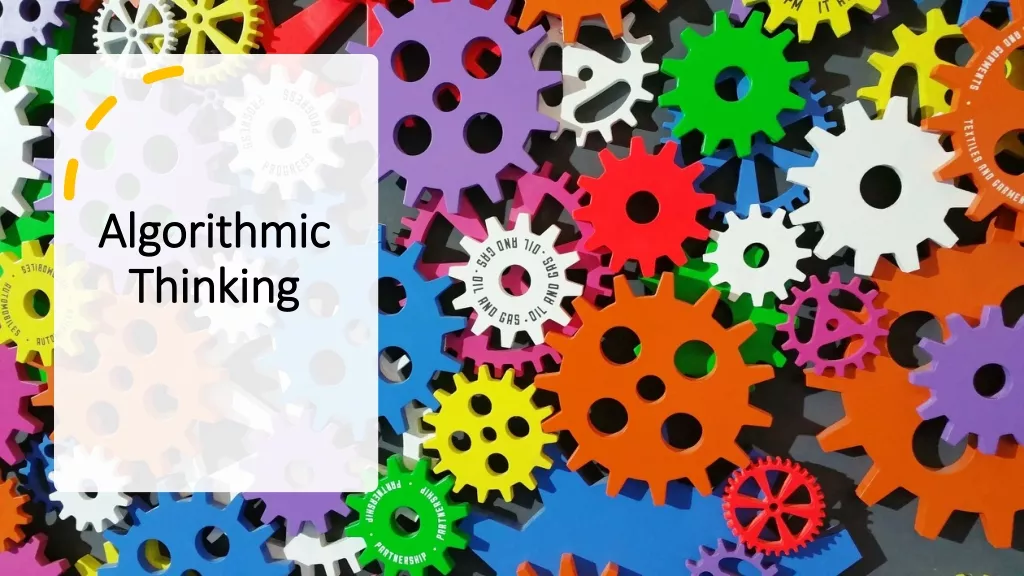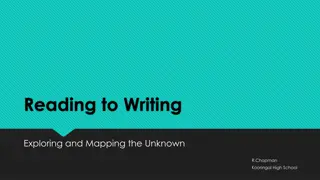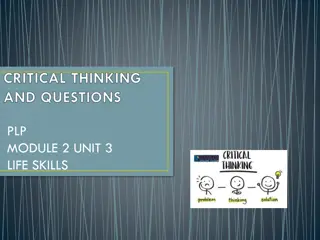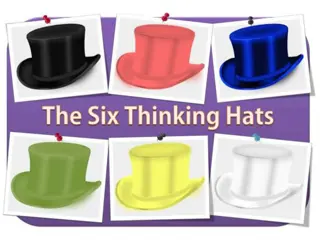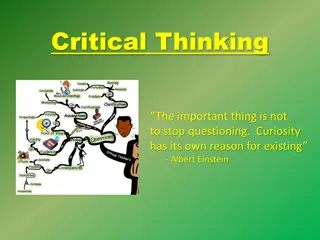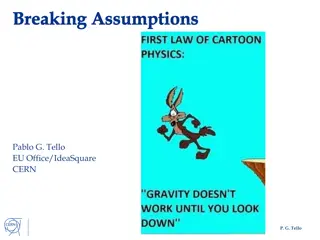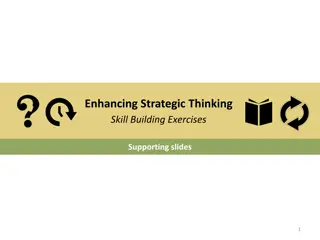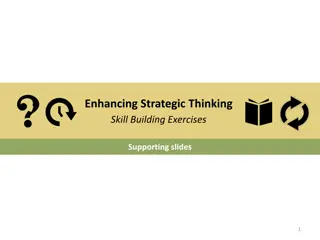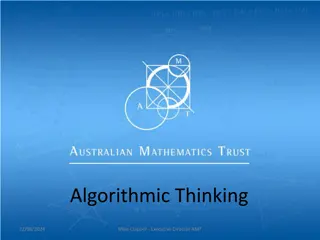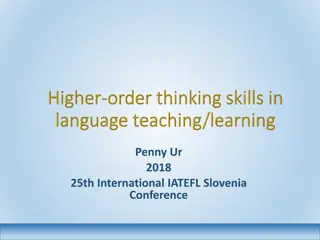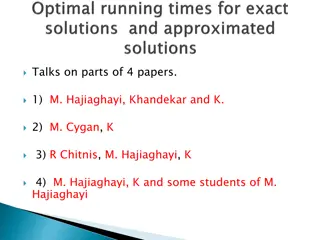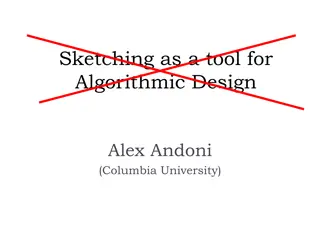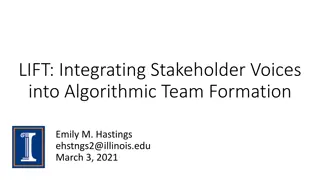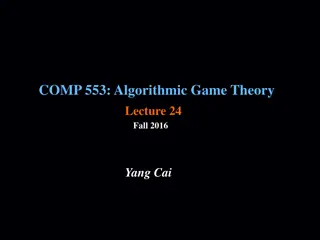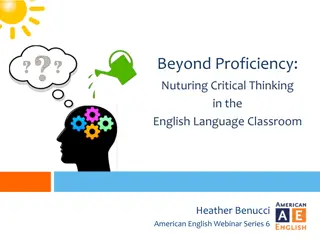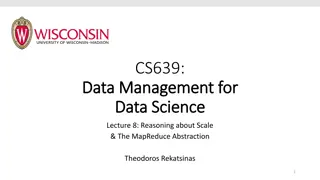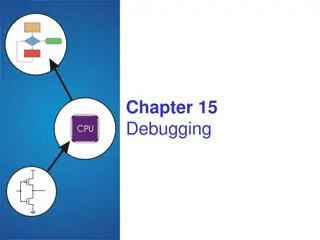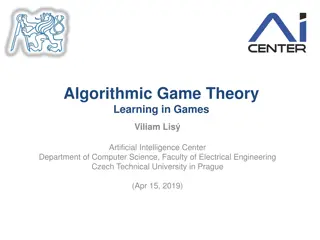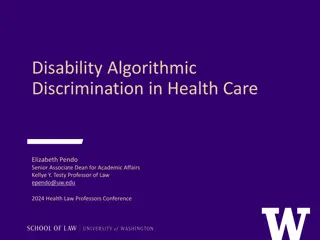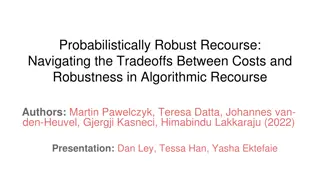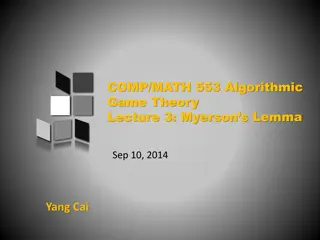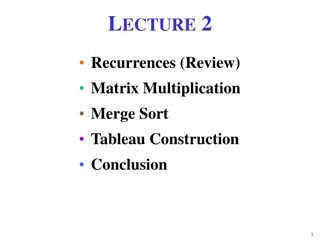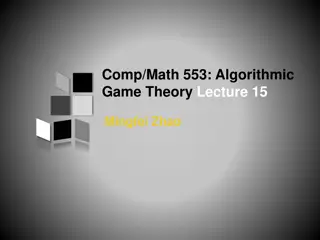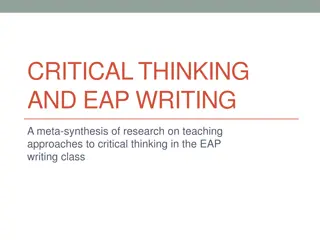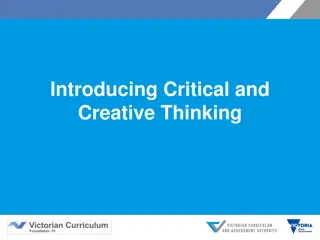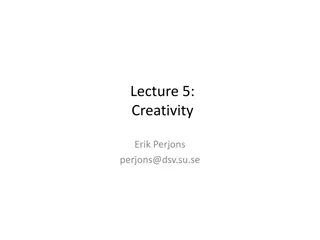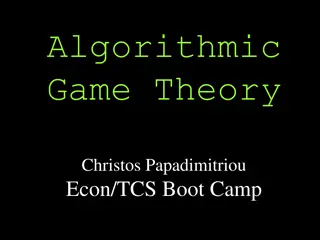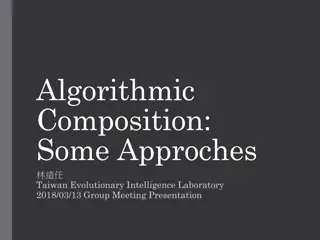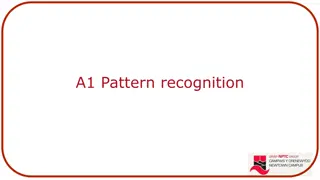Algorithmic Thinking: Key Concepts and Importance
Algorithmic thinking is a crucial skill that involves problem-solving through precisely defined instructions. This competency, applicable beyond computing, entails analyzing problems, identifying steps to solve them, and designing efficient algorithms. The importance of algorithmic thinking lies in
2 views • 13 slides
Unleashing Creativity: The Power of Creative Thinking in Innovation
Creativity and creative thinking, as described by Dr. Prabhat K. Dwivedi, are essential for purposeful learning, economic growth, and innovation. Understanding the types of creative thinking and the importance of nurturing it can lead to personal growth, improved problem-solving skills, and enhanced
2 views • 12 slides
Decoding Symbolic Thinking: Exploring the Power of Symbols in Learning and Perception
Delve into the world of symbolic thinking through the eyes of renowned artist René Magritte and explore how symbols shape our perception and understanding of the world. From dissecting Magritte's iconic painting to unraveling the intricacies of language as a symbolic system, journey through the int
3 views • 15 slides
Enhancing Critical Thinking Skills Through KWHL Chart
Critical thinking entails questioning and seeking more information before accepting ideas. The KWHL chart method is introduced to improve critical thinking skills, encouraging students to note what they know, what they want to learn, how they can learn more, and what they have learned. Engaging in a
0 views • 5 slides
Introduction to Six Thinking Hats Method for Effective Group Decision Making
Explore the Six Thinking Hats method, a powerful tool for facilitating group discussions and decision-making processes. This method encourages participants to approach problems from various perspectives represented by different colored 'hats'. By simplifying thinking and fostering constructive dialo
2 views • 24 slides
Enhancing Critical Thinking Skills in Daily Life
This content emphasizes the importance of critical thinking in various aspects of life, including personal, professional, academic, and spiritual realms. It delves into the significance of active learning, cultivating an open mind, separating emotions from facts, and avoiding logical fallacies. Prac
1 views • 17 slides
Unlocking Creativity and Innovation: Lateral Thinking vs Logical Thinking
Embrace the power of lateral thinking to challenge assumptions, generate new possibilities, and break free from traditional logic. Discover how logical thinking and lateral thinking differ in their approach to problem-solving, and learn how to leverage both methods to spur creativity and innovation.
1 views • 35 slides
HotFuzz: Discovering Algorithmic Denial-of-Service Vulnerabilities
A detailed exploration of algorithmic complexity bugs and insight into distributed micro-fuzzing methods. The study uncovers vulnerabilities through guided micro-fuzzing approaches, emphasizing the importance of AC bug detection and fuzz testing techniques such as seed inputs, fuzz observations, and
0 views • 14 slides
Critical Thinking in Islamic Methodology
Explore the concept of critical thinking in Islam, identifying key skills and understanding the importance of constructive criticism. Delve into the methodology of thinking in Islam that transcends superficial understanding, enabling individuals to distinguish between good and bad, correct and incor
2 views • 12 slides
Developing Strategic Thinking Skills for Future Army Leaders
Enhancing strategic thinking skills is essential for future army leaders to anticipate change, think long-term, and serve national interests effectively. The provided slides outline foundational skills needed for strategic thinking, emphasizing competencies like information gathering, critical think
1 views • 30 slides
Right to an Explanation in GDPR and AI Decision Making
The paper delves into the necessity for Explainable AI driven by regulations such as the GDPR, which mandates explanations for algorithmic decisions. It discusses the debate surrounding the existence of a legally binding right to explanation and the complexities of accommodating algorithmic machines
0 views • 22 slides
Critical Thinking in a Digital Society
Delve into the realm of critical thinking in the modern era, where information is readily available. Discover how easy access to data impacts our ability to think critically. Explore the importance of critical thinking and its application in today's society. Learn about the six-step critical thinkin
1 views • 32 slides
Evolution of Algorithms and Computer Science Through History
The history of algorithms and algorithmic thinking dates back to ancient times, with the development of general-purpose computational machines by Charles Babbage in the 19th century marking a significant advancement. The term "computer science" emerged in 1959, encompassing theoretical computer scie
1 views • 39 slides
Making Thinking Visible (MTV) and Its Impact on Learning
Making Thinking Visible (MTV) is a concept that integrates higher-order thinking skills with subject matter learning, aiming to develop students' critical thinking abilities alongside subject knowledge. Rooted in research by Harvard University's Project Zero group, MTV emphasizes sustained thinking
1 views • 20 slides
Enhancing Strategic Thinking Skills through Exercises
This presentation deck focuses on the importance of developing foundational skills for effective strategic thinking, particularly for current and future army leaders. It covers key competencies such as continuous information gathering, learning, critical thinking, and understanding historical perspe
2 views • 22 slides
Computational Thinking, Algorithms & Programming Overview
This unit covers key concepts in computational thinking, including decomposition, abstraction, and algorithmic thinking. Decomposition involves breaking down complex problems, abstraction focuses on identifying essential elements, and algorithmic thinking is about defining clear instructions to solv
1 views • 5 slides
Algorithmic Thinking in Digital Systems
Explore the application of algorithmic thinking in digital systems through the journey of Mike Clapper, the Executive Director of AMT. Learn about recognizing patterns in data, creating algorithms to solve problems, and utilizing information systems creatively. Enhance your knowledge of digital syst
0 views • 56 slides
Enhancing Cognitive Skills through Higher-Order Thinking in Education
Exploring the importance of higher-order thinking skills in education, this content delves into the distinction between lower and higher-order skills, the elements of Blooms' taxonomy, and the significance of critical and creative thinking. It highlights the value of analysis, precision, logic, crit
1 views • 60 slides
Insights into Advanced Algorithmic Problems
Delve into discussions surrounding complex algorithmic challenges, such as the limitations in solving the 3-SAT problem within specific time bounds, the Exponential Time Hypothesis, proving lower bounds for algorithms in various scenarios, and exploring approximation ratios in algorithm design. Thes
1 views • 65 slides
Sketching as a Tool for Algorithmic Design by Alex Andoni - Overview
Utilizing sketching in algorithmic design, Alex Andoni from Columbia University explores methodologies such as succinct efficient algorithms, dimension reduction, sampling, metric embeddings, and more. The approach involves numerical linear algebra, similarity search, and geometric min-cost matching
0 views • 18 slides
Algorithmic Issues in Tracking: A Deep Dive into Mean Shift, EM, and Line Fitting
Delve into algorithmic challenges in tracking tasks, exploring techniques like mean shift, Expectation-Maximization (EM), and line fitting. Understand the complexities of differentiating outliers and inliers, with a focus on segregating points into best-fit line segments.
0 views • 44 slides
Greedy Algorithms in Algorithmic Design
Greedy algorithms in algorithmic design involve making the best choice at each step to tackle large, complex problems by breaking them into smaller sub-problems. While they provide efficient solutions for some problems, they may not always work, especially in scenarios like navigating one-way street
2 views • 9 slides
Enhancing Algorithmic Team Formation Through Stakeholder Engagement
Integrating stakeholder voices is crucial in algorithmic team formation to ensure a positive team experience, quality outcomes, and high performance. This research explores learner-centered approaches and considers various team formation methods, highlighting their strengths and weaknesses in educat
0 views • 37 slides
Brouwer's Fixed Point Theorem and Nash's Proof in Algorithmic Game Theory
Explore the foundational theorems of Brouwer and Nash in Algorithmic Game Theory. Dive into Brouwer's Fixed Point Theorem, showcasing the existence of fixed points in continuous functions. Delve into Nash's Proof, unveiling the Nash equilibrium in game theory. Discover visualizations and constructio
0 views • 23 slides
Enhancing Critical Thinking Skills in the English Language Classroom
Explore the importance of nurturing critical thinking skills in the EFL classroom through understanding the essence of critical thinking, discussing its definitions, and embracing practical ideas for implementation. Delve into the process of critical thinking, integrating Bloom's Taxonomy to foster
0 views • 50 slides
Scalability and Algorithmic Complexity in Data Management for Data Science
This lecture delves into the concept of scalability in data management for data science, covering operational and algorithmic aspects. It discusses the importance of efficient resource utilization, scaling out to multiple computing nodes, and managing algorithmic complexity for optimal performance i
0 views • 47 slides
Proposal for Directive to Enhance Working Conditions in Platform Work
The proposal aims to address challenges in platform work, including employment status classification and algorithmic management issues. It seeks to improve transparency, fairness, and accountability in algorithmic decision-making, correctly determine employment status, enhance transparency in platfo
0 views • 13 slides
Debugging in High-Level Languages
Debugging in high-level languages involves examining and setting values in memory, executing portions of the program, and stopping execution as needed. Different types of errors – syntactic, semantic, and algorithmic – require specific debugging approaches. Syntactic errors are related to code l
0 views • 9 slides
Algorithmic Game Theory Learning in Games by Viliam Lis
The content discusses the concept of algorithmic game theory learning in games, covering topics such as online learning, prediction, best response dynamics, and convergence to Nash equilibrium. It explores how simple learning agents achieve equilibrium outcomes and the application of algorithms in v
0 views • 23 slides
Algorithmic Discrimination in Health Care: Protecting Vulnerable Patients
Elizabeth Pendo and Jennifer D. Oliva discuss disability discrimination in health care algorithms, advocating for legal protections under Section 504, ADA, and ACA. Their article proposes strategies to combat algorithmic bias and enhance antidiscrimination efforts in the 2024 Section 1557 final rule
0 views • 13 slides
Navigating Tradeoffs in Algorithmic Recourse: A Probabilistic Approach
This paper introduces PROBE, a Probabilistically Robust Recourse framework allowing users to balance cost and robustness in algorithmic recourse. Users can choose the recourse invalidation rate, enabling more tailored and efficient recourse management compared to existing methods. PROBE enhances cos
0 views • 17 slides
Myerson's Lemma in Algorithmic Game Theory
Myerson's Lemma is a fundamental concept in algorithmic game theory, particularly in the context of Sponsored Search Auctions. This lecture delves into the application of Myerson's Lemma to ensure truthful bidding as a dominant strategy, maximize social welfare, and maintain polynomial running time
1 views • 19 slides
Algorithmic Complexity Measures and the Master Method
In this study, we explore key concepts in algorithmic complexity, including recurrences, matrix multiplication, merge sort, and tableau construction. We delve into the Master Method for solving recurrences, examining Cases 1, 2, and 3, and providing solutions for each scenario. Additionally, we disc
0 views • 61 slides
Algorithmic Game Theory Lecture on Prophet Inequality and Auction Design
In this lecture on Algorithmic Game Theory, Mingfei Zhao discusses the Prophet Inequality and its application to single-item auctions. The lecture covers the concept of Prophet Inequality, strategies to guarantee expected payoffs, and different auction designs such as the Bulow-Klemperer Theorem and
0 views • 10 slides
Enhancing Critical Thinking in EAP Writing: A Meta-Synthesis Study
Investigating the teaching approaches to critical thinking in EAP writing classes, this meta-synthesis research delves into the importance of critical thinking, key issues in the literature review, defining critical thinking, enhancing criticality in academic writing, and understanding critical thin
0 views • 14 slides
Enhancing Critical and Creative Thinking in Education
The Victorian Curriculum F-10 emphasizes the development of critical and creative thinking skills among students. By focusing on understanding thinking processes, fostering confidence in evaluating thinking across various contexts, and promoting logical and strategic thinking, this curriculum aims t
0 views • 5 slides
Creativity and Design Thinking Strategies
Understand the concepts of divergent and convergent thinking in creativity, the importance of empathetic thinking in design, and the role of lateral thinking in generating innovative ideas. Guidelines emphasize the need to allow sufficient time for divergent thinking to foster creative outcomes befo
0 views • 16 slides
Evolution of Algorithmic Game Theory in Computer Science
The evolution of Algorithmic Game Theory (AGT) in the realm of Computer Science showcases the intersection of economics and theoretical computation. Before 1995, notable researchers like von Neumann and Megiddo laid the foundation for AGT. Concepts such as computation as a game, bounded rationality,
0 views • 62 slides
Algorithmic Composition Techniques in Music Generation
Algorithmic composition involves the use of algorithms to create music, mimicking human composers by generating music based on specific rules and structures. This presentation delves into various approaches such as DeepBach, MuseGAN, and EMI, highlighting the use of evolutionary algorithms, machine
2 views • 35 slides
Pattern Recognition in Computational Thinking
Pattern recognition in computational thinking involves identifying common elements, interpreting differences, and predicting based on patterns. It helps simplify complex problems by recognizing similarities and characteristics shared among them. Through repetition and algorithmic processes, patterns
0 views • 6 slides
